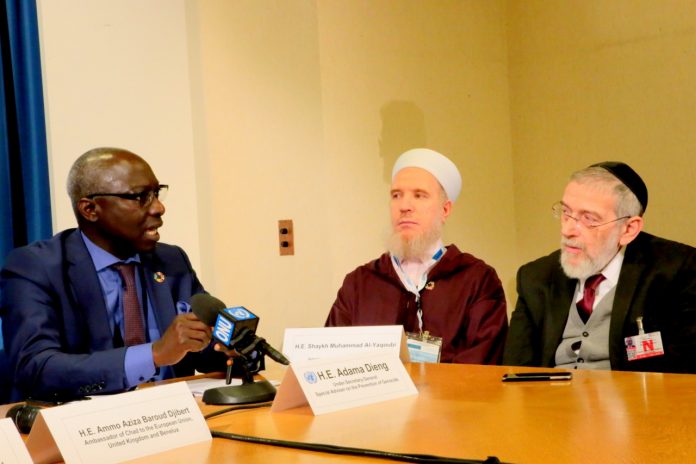The United Nations special adviser on the prevention of genocide during the Second Global Summit on Religion Peace and Security in Geneva warned that similar signs to those of the 1930s in Europe are resurfacing.
Adama Dieng, a UN under-secretary-general spoke at a UN press conference with a range of religious leaders on 1 May, the second day of the summit.
“Signs of the ’30s are resurfacing. We are witnessing anti-Semitism rising. We see anti-Muslim hatred. We are seeing the persecution of Christians…xenophobia and incitement,” said Dieng, a lawyer from Senegal.
“Unless we are blind or of bad faith, we should admit that it’s time to stand up, it is time to speak out.”
He said religion is not the problem, noting: “Those who are committing the crimes are simply manipulating religion.”
Dieng also said, “Today we cannot achieve the successful implementation of the Sustainable Development Goal if we don’t invest in partnership.”
Shaykh Muhammad Al-Yaqoubi, a Syrian Islamic scholar and religious leader who has published a book refuting the group calling itself ISIS said, “Religion is a source of peace. Anything that contradicts this is not a part of religion.”
Religion sometimes hijacked
He said religion is sometimes “hijacked” to achieve dubious political goals.
“Our job as religious leaders is to stop those hijacking religion,” said Muhammad, noting that, “There is no feud between Islam and Judaism.”
Rabbi Michael Melchior, speaking of his religion, warned that its holy book, the Torah, “can be the drug of death or the tree of life…Let us turn it into the tree of life.”
He spoke of how his group “created a religious coalition for peace in the Middle East which is also working with radicals,” people convicted of crimes and terrorism because they “are the ones we need to convince.”
“To be with nice people is easy,” he said. “We need to work with all groups to empower each other.”
At the press conference, Dieng noted it is not just leaders from the extreme right who promote anti-migrant hatred and xenophobia, but the action or inaction of the far left also does this.
Rev. Bonnie Evans-Hills, an Anglican who is coordinator of a group called the UK Coalition, mentioned that mainstream political leaders could also fuel hatred such as one UK politician who said Muslim women wearing burkas “look like letter boxes”.
Dieng said that the speaker was former UK Foreign Secretary Boris Johnson “and this shows how dangerous it is” when people in leadership foment against other groups.
Rudelmar Bueno de Faria, ACT Alliance general secretary, on the second day of the conference, said, that “simplistic and polarized fundamentalist narratives” hinder those with “balanced views that acknowledge the multi-causal nature of poverty, conflict, exclusion, discrimination and hate speech.”
He said: “Religious leaders must act as a moral compass and welcome those who want to protect the most vulnerable against the regression of their fundamental human rights.”
World Council of Churches, oikoumene.org














